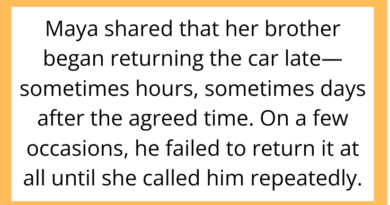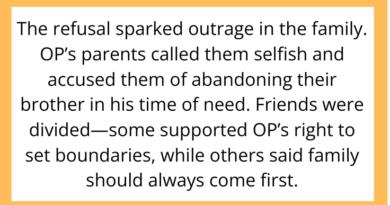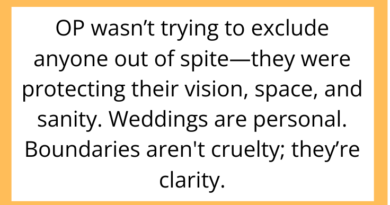AITAH for Refusing to Pay for My Brother’s Destination Wedding After He Spent His Savings on a Car?
When it comes to family and finances, things get messy fast. But what happens when a sibling expects you to foot the bill for their life choices—because you were responsible with your money?
That’s exactly the dilemma one user faced when their brother demanded they cover his destination wedding after blowing through his savings on a luxury car. In this AITAH story, we’re diving into family guilt, financial boundaries, and whether being the “stable” sibling means you owe anyone anything.
The Scenario: A Tale of Two Brothers

Meet Aryan, a 34-year-old software engineer who’s always been financially responsible. He’s saved steadily, built an emergency fund, invested smartly, and lives within his means. His younger brother Rohan, 28, is the opposite—he lives for the moment, spends impulsively, and recently dropped a huge chunk of his savings on a brand-new sports car.
A few months later, Rohan got engaged and decided to host a lavish destination wedding in Goa.
But there was a problem: he was broke.
Naturally, he turned to Aryan, saying, “You have the money. You’re my brother. You should help.”
Aryan declined.
The Fallout: Family Turns Against Aryan

Aryan didn’t shame Rohan. He didn’t rub in his good decisions. He simply said, “I’m not comfortable funding your wedding. You made your choices, and this isn’t a need—it’s a luxury.”
What happened next?
Rohan exploded. He accused Aryan of being greedy, unsupportive, and “flexing his money” while letting his own brother struggle. Their parents also weighed in, calling Aryan “cold” and saying it was his duty to step up.
Now, Aryan feels torn. He posted on Reddit’s r/AITAH to ask the internet: “Am I the asshole for refusing to pay for my brother’s wedding, even though I can afford it?”
The Bigger Question: Does Responsibility Mean Obligation?

The Case for Aryan: Boundaries and Financial Freedom
Aryan’s supporters say the answer is crystal clear: No, you’re not the villain for saying no.
He didn’t get lucky. He worked hard, made sacrifices, and lived modestly. That allowed him to build financial stability. Being responsible shouldn’t turn into a family tax.
If Rohan can afford a luxury car, he can afford a modest wedding—or he can wait until he saves up. Expecting someone else to fund a destination event just because they’re “better off” isn’t support—it’s entitlement.
The Case for Rohan: Brotherhood Means Support
From Rohan’s side, the issue isn’t just money—it’s family loyalty. In his view, Aryan has more than enough, and helping his brother celebrate a once-in-a-lifetime event shouldn’t be a big deal.
Indian weddings often come with deep emotional and cultural weight. Family is expected to chip in, and not doing so—especially if you’re financially capable—can be seen as a personal slight.
But does cultural pressure override personal choice?
Reddit Reacts: A Financial Wake-Up Call

Reddit commenters were almost unanimously on Aryan’s side.
Top comment:
“You’re not his ATM. He made an adult decision to buy a flashy car instead of planning his life. That’s not on you.”
Another user added:
“It’s wild how people treat financially responsible family members like backup credit cards.”
Yet a few voices tried to find middle ground, suggesting Aryan could offer to pay for something symbolic—like flights or a small part of the event—to preserve peace while maintaining boundaries.
Financial Guilt: A Silent Pressure Among Siblings

This AITAH post taps into a larger truth: in many families, the more responsible sibling ends up carrying the emotional (and financial) weight.
Whether it’s:
-
Helping with loans
-
Covering emergencies
-
Or funding weddings
There’s a pattern of guilt and expectation attached to “being the one who has it together.”
But here’s the thing—having money doesn’t mean you owe it to anyone. Especially when it rewards someone else’s bad decisions.
A Lesson in Saying No

Why Aryan Was Right to Set a Boundary
-
Weddings Are a Want, Not a Need: Rohan isn’t sick. He’s not homeless. He wants a luxury event—and that’s not Aryan’s responsibility.
-
Helping Should Be Voluntary: True generosity comes from choice, not coercion. If you’re guilt-tripped into giving, it’s not generosity—it’s manipulation.
-
Resentment Breeds in Silence: If Aryan had said yes out of guilt, it could’ve led to long-term resentment and damaged the relationship even more.
How to Say No Without Burning Bridges
-
Be Honest But Respectful: “I can’t contribute financially, but I wish you all the best.”
-
Avoid Lecturing: Don’t criticize past decisions—just state your boundary.
-
Offer Alternatives: “If you decide on a smaller celebration, I’d be happy to support in other ways.”
Final Verdict: Not the Villain, Just the Boundary-Setter

AITAH? No, Aryan is not the villain.
He’s someone who made thoughtful choices and isn’t letting guilt force him into funding someone else’s luxury. That’s not selfish—it’s self-respect.
Financial boundaries don’t make you heartless. They make you responsible not just with money—but with your mental peace.



